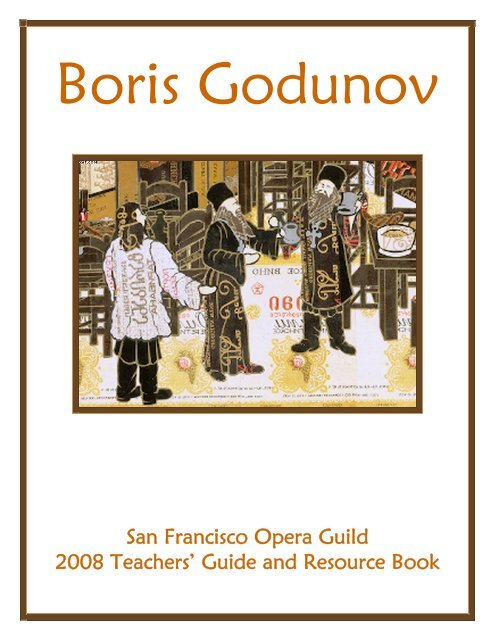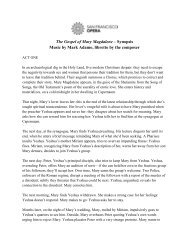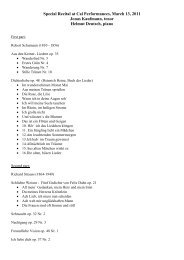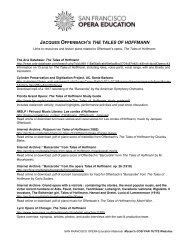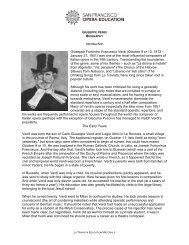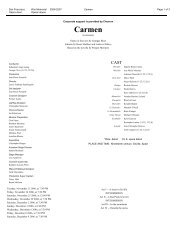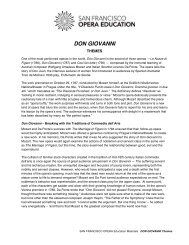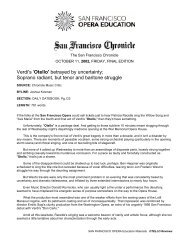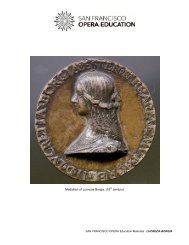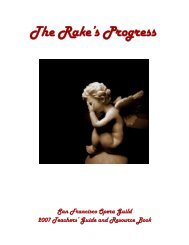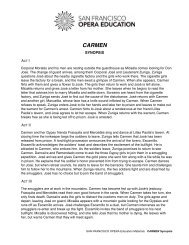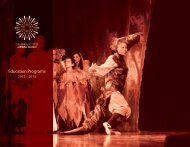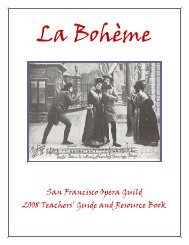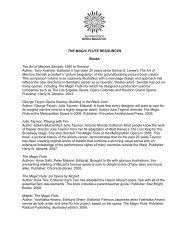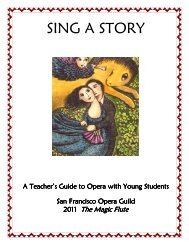Boris Godunov - San Francisco Opera
Boris Godunov - San Francisco Opera
Boris Godunov - San Francisco Opera
Create successful ePaper yourself
Turn your PDF publications into a flip-book with our unique Google optimized e-Paper software.
<strong>Boris</strong> <strong>Godunov</strong><br />
<strong>San</strong> <strong>Francisco</strong> <strong>Opera</strong> Guild<br />
2008 Teachers’ Guide and Resource Book
The mission of <strong>San</strong> <strong>Francisco</strong> <strong>Opera</strong> Guild is to provide cultural<br />
nourishment to the Northern California community through education,<br />
outreach programs, special events and financial support to the<br />
<strong>San</strong> <strong>Francisco</strong> <strong>Opera</strong> Association.<br />
Welcome to<br />
<strong>Boris</strong> <strong>Godunov</strong><br />
Student Dress Rehearsal<br />
October 19, 2008<br />
2
Many thanks to the proud sponsors of the 2008<br />
<strong>San</strong> <strong>Francisco</strong> <strong>Opera</strong> Education Programs:<br />
Columbia Foundation<br />
Zellerbach Family Foundation<br />
Corporate Sponsor, Student Dress Rehearsals<br />
3
Dear Educator:<br />
Thank you for your participation in <strong>San</strong> <strong>Francisco</strong> <strong>Opera</strong> Guild’s 2008-2009 education<br />
programs! The <strong>Opera</strong> Guild’s Teacher’s Guides for the 2008 Student Dress Rehearsals<br />
are publications that you can use as a tool to assist you in preparing your students for their<br />
exposure to opera.<br />
<strong>Opera</strong> is a complete art form and expression of culture. It encompasses music, theatre,<br />
dance, design, literature, history, and social movement in one sweep. This guide will<br />
provide you with background on the composer, history of the source material for the opera,<br />
a synopsis of the story, a bit about the political climate of the time, and extension exercises<br />
that can be incorporated into your curriculum.<br />
A table of contents will guide you to the information on areas you wish to cover with your<br />
students. In addition there is a guide for opera etiquette so your classes will be familiar<br />
with the expectations of an audience member. You will find a collection of assignments<br />
and activities that will engage your students in the world of the play and we hope this<br />
involvement will excite them further about seeing <strong>Boris</strong> <strong>Godunov</strong>.<br />
We are eager to hear your feedback on the opera experience with your students. Please<br />
fill out the evaluation form in the back of this guide after your trip to the opera. Please feel<br />
free to include suggestions for future guides, activities that were particularly successful, and<br />
especially any student work you would like to share. If you have any questions please do<br />
not hesitate to contact us. We hope you and your students enjoy the experiences at the<br />
opera!<br />
Caroline Altman C.J.Van Pelt<br />
Director of Education Vice President, Education<br />
<strong>Boris</strong> <strong>Godunov</strong> Teacher’s Resource Guide © 2008 <strong>San</strong> <strong>Francisco</strong> <strong>Opera</strong> Guild.<br />
<strong>San</strong> <strong>Francisco</strong> <strong>Opera</strong> Guild<br />
War Memorial <strong>Opera</strong> House 301 Van Ness Avenue <strong>San</strong> <strong>Francisco</strong>, CA 94102<br />
(415) 565-3238 / (415) 861-0242 fax<br />
education@sfopera.com www.sfopera.com/education<br />
4
Table of Contents<br />
<strong>Boris</strong> <strong>Godunov</strong> ..........................................................................page 6<br />
History ..................................................................................page 6<br />
The <strong>Opera</strong> ............................................................................page 7<br />
Synopsis...............................................................................page 8<br />
Setting pictures.....................................................................page 12<br />
Modest Mussorgsky .............................................................page 15<br />
From Page to Stage .............................................................page 19<br />
Why you already know Mussorgsky .....................................page 21<br />
Curricular Connections..............................................................page 22<br />
The Five C’s: More to the story ...........................................page 23<br />
Character Creation ...............................................................page 24<br />
Prompts for discussion and activities ...................................page 26<br />
Beyond the Story .................................................................page 27<br />
Composition and Design ......................................................page 28<br />
<strong>Opera</strong> ........................................................................................page 29<br />
A Short Introduction to <strong>Opera</strong>...............................................page 29<br />
<strong>Opera</strong>tic Voices ....................................................................page 31<br />
<strong>Opera</strong> Glossary ....................................................................page 33<br />
Careers in <strong>Opera</strong>..................................................................page 37<br />
Production Questions and Activities....................................page 41<br />
The <strong>Opera</strong> Orchestra ...........................................................page 42<br />
<strong>Opera</strong> and the California State Frameworks ........................page 43<br />
Audience Etiquette ....................................................................page 44<br />
Bibliography...............................................................................page 45<br />
Teacher Evaluation ...................................................................page 46<br />
5
Making History—What you need to know first<br />
<strong>Boris</strong> <strong>Godunov</strong><br />
(1551–1605)<br />
Historical basis of the plot<br />
Vasiliy Shuisky<br />
(1552–1612)<br />
The Pretender<br />
(c.1582–1606)<br />
Marina Mniszech<br />
(1588–1614)<br />
An understanding of the drama of <strong>Boris</strong> <strong>Godunov</strong> may be facilitated by a basic knowledge of the historical<br />
events surrounding the Time of Troubles, the interregnum period of relative anarchy following the end of the<br />
Ryurik Dynasty (1598) and preceding the Romanov Dynasty (1613).<br />
Key events are as follows:<br />
• 1584 – Ivan IV "The Terrible", the first Grand Prince of Muscovy to officially adopt the title Tsar<br />
(Caesar), dies. Ivan’s successor is his feeble son Fyodor, now Fyodor I, who cares only for spiritual<br />
matters and leaves the affairs of state to his capable brother-in-law, boyar <strong>Boris</strong> <strong>Godunov</strong>, now de<br />
facto regent.<br />
• 1591 – Ivan’s other son Dmitry dies under mysterious circumstances in Uglich. An investigation,<br />
ordered by <strong>Godunov</strong> and carried out by Prince Vasily Shuisky, determines that the Tsarevich, while<br />
playing with a knife, had an epileptic seizure, fell, and died from a self-inflicted wound to the throat.<br />
Dmitry's mother, Maria Nagaya, exiled with him to Uglich by <strong>Godunov</strong>, claims he was assassinated.<br />
Rumors linking <strong>Boris</strong> to the crime are circulated by his enemies.<br />
• 1598 – Tsar Fyodor I dies. He is the last in a line of representatives of the Ryurik Dynasty who have<br />
ruled Russia for 7 centuries. Patriarch Job of Moscow nominates <strong>Boris</strong> to succeed Fyodor I as Tsar,<br />
despite the rumors that <strong>Boris</strong> ordered the murder of Dmitry. <strong>Boris</strong> agrees to ascend the throne only if<br />
elected by the Zemsky Sobor. This the assembly does unanimously, and <strong>Boris</strong> is crowned the same<br />
year.<br />
• 1604 – A pretender to the throne appears, claiming to be Tsarevich Dmitry, but believed to be in<br />
reality one Grigory Otrepyev. He gains the support of the Polish aristocracy, and, obtaining a force of<br />
soldiers, he marches on Moscow. Crossing into Russia, Dmitry’s invasion force is joined by<br />
disaffected Cossacks. However, after a few victories, the campaign loses momentum.<br />
• 1605 – <strong>Boris</strong> dies of unknown causes. He is succeeded by his son Fyodor, now Fyodor II. The death<br />
of <strong>Boris</strong> gives new life to the campaign of the False Dmitry, who enters Moscow. Boyars who flock to<br />
his side murder Fyodor II and his mother. The False Dmitry is crowned. Prince Shuysky begins<br />
plotting against him.<br />
• 1606 – The Russian boyars are alarmed by Dmitri's Polish and Catholic alliances and his western<br />
habits. He is murdered shortly after wedding Marina Mniszech, and is succeeded by Vasily Shuysky,<br />
now Vasily IV.<br />
• 1610 – Vasily IV is deposed, and dies two years later in a Polish prison. Another pretender claiming<br />
to be Dmitry Ivanovich, False Dmitry II, is murdered.<br />
• 1611 – Yet a third pretender, False Dmitry III, appears. He is captured and executed in 1612.<br />
• 1613 – The Time of Troubles comes to a close with the accession of Mikhail Romanov, son of Fyodor<br />
Romanov, who had been persecuted under <strong>Boris</strong> <strong>Godunov</strong>'s reign.<br />
6
<strong>Boris</strong> <strong>Godunov</strong>, the opera<br />
<strong>Boris</strong> <strong>Godunov</strong>, the Tsar .................................................. Bass<br />
Fyodor, his son.................................................................. Mezzo-soprano<br />
Xenia, his daughter ............................................................ Soprano<br />
Nurse ................................................................................. Mezzo-soprano<br />
Shchelkalov, clerk of the Duma ........................................ Baritone<br />
Pimen, an old monk ........................................................... Bass<br />
Grigory, the false Dimitri.................................................... Tenor<br />
Prince Shuisky, advisor to <strong>Boris</strong>....................................... Tenor<br />
Marina, daughter of the Voivode of <strong>San</strong>domir ................... Mezzo-soprano<br />
Hostess of the Inn ............................................................ Mezzo-soprano<br />
Varlaam ............................................................................. Bass<br />
Missail ............................................................................... Tenor<br />
Rangoni, a Jesuit priest..................................................... Baritone or Bass<br />
Nikitich, Police Officer ....................................................... Bass<br />
Boyar Khruschev.............................................................. Tenor<br />
Russia and Poland 1598-1605<br />
First performance at St. Petersburg, February 8, 1874<br />
The Mariinsky Theater opened in 1860. <strong>Boris</strong> <strong>Godunov</strong> received its premiere<br />
there in 1874<br />
7
SYNOPSIS<br />
1. The Courtyard of the Novodevichiy Monastery near Moscow (1598).<br />
There is a brief introduction foreshadowing the 'Dimitri Motif'. The curtain opens on a crowd<br />
in the courtyard of the monastery, where the weary regent, <strong>Boris</strong> <strong>Godunov</strong>, has temporarily<br />
retired. Nikitich the police officer orders the assembled people to kneel. He encourages<br />
them to shout for <strong>Boris</strong> to accept the throne. They sing a chorus of supplication ("To whom<br />
dost thou abandon us, our father?"). The people are bewildered about their purpose and<br />
soon fall to bickering with each other, resuming their shouts only when the policeman<br />
threatens them with his club. Their chorus reaches a feverish climax. Andrey Shchelkalov,<br />
the Secretary of the Duma, appears from inside the convent, informs the people that <strong>Boris</strong><br />
still refuses the throne of Russia ("Orthodox folk! The boyar is implacable!"), and requests<br />
that they pray that he will relent. An approaching procession of pilgrims sings a hymn<br />
("Glory to Thee, Creator on high"), exhorting the people to crush the spirit of anarchy in the<br />
land, take up holy icons, and go to meet the Tsar. They disappear into the monastery. The<br />
people discuss the statements of the<br />
pilgrims. Many remain bewildered about the identity of<br />
this Tsar. The police officer interrupts their discussion, ordering them to appear the next<br />
day at the Moscow Kremlin. The people move on, stoically<br />
exclaiming "if we are to wail, we<br />
might as well wail at the Kremlin".<br />
2. Cathedral Square in the Moscow Kremlin (1598).<br />
The unforgettable orchestral introduction is based on bell motifs. From the porch of the<br />
Cathedral of the Dormition, Prince Shuisky exhorts the people to glorify Tsar <strong>Boris</strong>. As<br />
the<br />
people sing a great chorus of praise ("Like the glory of the beautiful sun in the sky"), a<br />
solemn procession of boyars exits the cathedral. The people kneel. <strong>Boris</strong> appears on the<br />
porch of the cathedral. The shouts of "Glory!" reach a crescendo and subside. <strong>Boris</strong><br />
addresses the people with a brief monologue ("My soul grieves") betraying a feeling of<br />
ominous foreboding. He prays for God's blessing, and hopes to be a good and just ruler.<br />
He invites the people to a great feast, and then proceeds to the Cathedral of the Archangel<br />
to kneel at the tombs of Russia's past rulers. The people wish <strong>Boris</strong> a long life ("Glory!<br />
Glory! Glory!"). A crowd breaks toward the cathedral. The police officers struggle<br />
to<br />
maintain order. The people resume their shouts of "Glory!"<br />
3. A Cell in the Chudov Monastery [within the Moscow Kremlin] (1603).<br />
Pimen, an aged monk, writes a chronicle ("Yet one last tale") of Russian history. The young<br />
novice Grigory awakes from a horrible (and prophetic) dream, which he relates to Pimen,<br />
in<br />
which he climbed a high tower, was mocked by the people of Moscow, and fell. Pimen<br />
advises him to fast and pray. Grigory voices his regret that he retired so soon from worldly<br />
affairs to become a monk. He envies Pimen's early life of adventure. Pimen speaks<br />
approvingly of Ivan the Terrible and his son Fyodor, who both exhibited great spiritual<br />
devotion, and draws a contrast with <strong>Boris</strong>, a who is believed to be responsible for the<br />
8
murder of Dmitri Ivanovich, true heir to the throne. At Grigory's request, Pimen tells the<br />
vivid details of the scene of the murder of Dimitri Ivanovich, which he witnessed in Uglich.<br />
Upon discovering<br />
the similarity in age between himself and the murdered Tsarevich,<br />
Grigory immediately conceives the idea of posing as “the Pretender.” As Pimen departs for<br />
Matins, Grigory declares that <strong>Boris</strong> shall escape neither the judgment of the people, nor<br />
that of God.<br />
4. An Inn on the Lithuanian Border (1603).<br />
There is a brief orchestral introduction based on three prominent themes from this scene.<br />
The Hostess enters and sings the 'Song of the Drake' ("I have caught a gray drake"). It is<br />
interrupted towards the end by approaching voices. The vagrants, Varlaam and Missail,<br />
who are begging for alms, and their companion Grigory, who is in secular garb, arrive and<br />
enter. After exchanging greetings, the rascally Varlaam requests some wine. When the<br />
Hostess returns with a bottle, he drinks and launches into a ferocious song ("It happened in<br />
the city of Kazan") of Ivan the Terrible's siege of Kazan. The two monks quickly become<br />
tipsy, and soon begin to doze. Grigory quietly asks the Hostess for directions to the<br />
Lithuanian border. Policemen appear in search of a fugitive heretic monk (Grigory) who has<br />
run off from the Chudov Monastery declaring that he will become Tsar in Moscow. Noticing<br />
Varlaam's suspicious behavior, the lead policeman thinks he has found his man. He cannot<br />
read the edict he is carrying, however, so Grigory volunteers to read it. He does so, but,<br />
eyeing Varlaam carefully, he substitutes Varlaam's description for his<br />
own. The policemen<br />
quickly seize Varlaam, who protests his innocence and asks to read the edict. He haltingly<br />
reads the description of the suspect, which of course matches Grigory. Grigory<br />
brandishes<br />
a dagger, and leaps out of the window. The men set off in pursuit.<br />
5. The Interior of the Tsar's Terem in the Moscow Kremlin (1604).<br />
Xenia, clutching a portrait of her betrothed who has died, sings a brief aria ("Where are<br />
you,<br />
my bridegroom?"). Her nurse and brother Fyodor attempt to cheer her up with some songs<br />
("A gnat was chopping wood" and "A song of this and that"). <strong>Boris</strong> suddenly enters in an<br />
agitated state, briefly consoles Xenia, and then sends her and her nurse to their own<br />
quarters. After encouraging his son to resume his studies, he gives vent to his emotions in<br />
a long and fine monologue ("I have attained supreme power"). At the end of this aria he<br />
reveals that he has been disturbed by a vision of a bloody child begging for mercy. A<br />
commotion breaks out in his children's quarters. <strong>Boris</strong> sends Fyodor to ascertain the nature<br />
of the disturbance. The boyar-in-attendance brings word of the arrival of Prince Shuisky,<br />
and reports a denunciation against him for his intrigues. Fyodor returns to relate the<br />
whimsical tale ("Our little parrot was sitting") of his pet parrot's escape. <strong>Boris</strong> advises<br />
Fyodor to beware of evil and cunning advisors such as Shuisky when he becomes Tsar.<br />
Shuysky enters just at that moment, bearing grave tidings. A Pretender has appeared in<br />
Lithuania. <strong>Boris</strong> angrily demands to know his identity. Shuisky fears the Pretender might<br />
attract a following bearing the name of Dimitri. Shaken by this revelation, <strong>Boris</strong> dismisses<br />
Fyodor. Clearly on the edge of madness, he asks Shuisky whether he has ever heard of<br />
dead children rising from their graves to interrogate Tsars. <strong>Boris</strong> wants Shuisky's assurance<br />
that the dead child he had seen in Uglich was really Dimitri. Shuisky confirms this in a brief<br />
and beautiful aria ("In Uglich, in the cathedral"). But he gives hints that a miracle has<br />
occurred. <strong>Boris</strong> begins choking in a paroxysm of guilt and remorse, and gives a sign for<br />
Shuisky to depart. A clock begins chiming. <strong>Boris</strong> hallucinates (Hallucination<br />
or 'Clock'<br />
Scene). The spectre of the dead Dimitri reaches out to him. Addressing the apparition, he<br />
9
denies<br />
his responsibility for the crime: "Begone, begone child! Not I... the will of the<br />
people!" He collapses, praying that God will have mercy on his guilty soul.<br />
6. Marina's Boudoir in <strong>San</strong>domir, Poland (1604).<br />
Maidens sing a delicate, sentimental song ("On the blue Vistula") to entertain Marina as her<br />
chambermaid dresses her hair. Marina declares her preference for heroic songs of chivalry.<br />
She dismisses everyone. Alone, she sings of her boredom ("How tediously and<br />
sluggishly"), of Dimitri, and of her thirst for adventure, power, and glory. The Jesuit Rangoni<br />
enters and attempts to obtain Marina's promise that when she becomes Tsaritsa she will<br />
convert the heretics of Moscow (Russian Orthodox Church) to the true faith (Roman<br />
Catholicism). When Marina wonders why this should be her burden, Rangoni angrily<br />
declares that she shall stop short of nothing, including sacrificing<br />
her honor, to obey the<br />
dictates of the church. Marina expresses contempt of his hypocritical insinuations and<br />
demands he leave. As Rangoni ominously tells her she is in the thrall of infernal forces,<br />
Marina collapses in dread. Rangoni demands her obedience.<br />
7. Mniszech's Castle in <strong>San</strong>domir. A Garden. A Fountain. A Moonlit Night (1604).<br />
Shimmering strings and harp accompany a pensive version of the 'Dimitri Motif'. The<br />
Pretender dreams of an assignation with Marina in the garden of her father's castle.<br />
However, to his annoyance, Rangoni finds him. However, he brings news from Marina. She<br />
begs to speak with him. The Pretender resolves to throw himself at Marina's feet, begging<br />
her to be his wife and Tsaritsa. He entreats Rangoni to lead him to Marina. Rangoni,<br />
however, first wants the Pretender to consider him a father, allowing him to follow his every<br />
step and thought. The Pretender agrees not to part from him if he will only allow him to see<br />
Marina. Rangoni convinces the Pretender to hide as the Polish nobles issue from the castle<br />
dancing a polonaise. Marina flirts, dancing with an older man. The Poles sing of taking the<br />
Muscovite throne, defeating the army of <strong>Boris</strong>, and capturing him. They return to the castle.<br />
The Pretender comes out of hiding. Marina appears and calls to him. He is lovesick. She,<br />
however, only wants to know when he will be Tsar, and declares she can only be seduced<br />
by a throne and a crown. The Pretender kneels at her feet. She tells him to be off, and<br />
calls<br />
him a lackey. Having reached his limit, he tells her he will depart the next day to lead his<br />
army to Moscow and to his father's throne. Furthermore, as Tsar, he will take pleasure in<br />
watching her come crawling back looking for her own lost throne, and will command<br />
everyone to laugh at her. She quickly changes her tune, and as they sing a duet ("O<br />
Tsarevich, I implore you"), she tells him she loves him. Rangoni slithers<br />
out of hiding to<br />
savor his accomplishment.<br />
8. The Square before St. Basil's Cathedral in Moscow (1605).<br />
A crowd mills about before the Cathedral of the Intercession (Vasiliy the Blessed) in Red<br />
Square. Many are beggars, and policemen occasionally appear. A group of men enters,<br />
discussing the anathema the deacon had declared on Grishka (Grigoryy) Otrepyev in the<br />
mass. They identify Grishka as being the Tsarevich. With growing excitement they sing of<br />
the advance of his forces to Kromï, of his intent to retake his father's throne, and of the<br />
death he will mete out to the <strong>Godunov</strong>s. A yuródivïy enters, pursued by urchins. He sings a<br />
nonsensical song ("The moon is flying, the kitten is crying"). The boys (urchins) greet him<br />
10
and rap on his metal hat. The yuródivïy has a kopek, which the urchins promptly steal. He<br />
whines pathetically. The Tsar's retinue issues from the Cathedral. The boyars distribute<br />
alms. In a powerful chorus ("Benefactor father (Give us bread)"), the hungry people beg<br />
for<br />
bread. As the chorus subsides, the yuródivïy's cries are heard. <strong>Boris</strong> asks why he cries.<br />
The yuródivïy reports the theft of his kopek and asks <strong>Boris</strong> to order the boys' slaughter, just<br />
as he did in the case<br />
of the Tsarevich. Shuisky wants the yuródivïy seized, but <strong>Boris</strong><br />
instead asks for the holy man's prayers. As <strong>Boris</strong> exits, the yurodivïy declares he cannot<br />
pray for Tsar Herod. The yuródivïy then sings his lament ("Flow,<br />
flow, bitter tears!") about<br />
the fate of Russia.<br />
9. The Faceted Palace in the Moscow Kremlin (1605).<br />
A session of the Duma is in progress. [The assembled boyars listen as Shchelkalov informs<br />
them of the Pretender's advance and requests they decide his fate.] After some arguments,<br />
the boyars agree ("Well, let's put it to a vote, boyars"), in a powerful chorus, that the<br />
Pretender and his sympathizers should be executed. Shuysky, whom they distrust, arrives<br />
with an interesting story. Upon leaving the Tsar's presence, he observed <strong>Boris</strong> attempting<br />
to drive away the ghost of the dead Tsarevich, exclaiming: "Begone, begone child!" The<br />
boyars accuse Shuysky of spreading lies. However, just at that moment, <strong>Boris</strong> enters,<br />
echoing Shuysky: "Begone child!" The boyars are horrified. After <strong>Boris</strong> comes to his<br />
senses, Shuysky informs him that a humble old man craves an audience. Pimen enters and<br />
tells the story ("One day, at the evening hour") of a blind man who heard the voice of the<br />
Tsarevich in a dream. Dmitry instructed him to go to Uglich and pray at his grave, for he<br />
has become a miracle worker in heaven.<br />
The man did as instructed and regained his sight.<br />
This story is the final blow for <strong>Boris</strong>. He calls for his son, declares he is dying ("Farewell, my<br />
son, I am dying"), and gives him final counsel.<br />
In a very dramatic and moving scene ("The<br />
bell! The funeral bell!"), he dies.<br />
10. A Forest Glade near Kromï (1605).<br />
Tempestuous music accompanies the entry of a crowd of vagabonds who have captured<br />
the boyar Khrushchev. The crowd taunts him, then bows in mock homage ("Not a falcon<br />
flying in the heavens"). The yuródivïy enters, pursued by urchins. He sings a nonsensical<br />
song ("The moon is flying, the kitten is crying"). The urchins greet him and rap on his metal<br />
hat. The yuródivïy has a kopek, which the urchins promptly steal. He whines pathetically.<br />
Varlaam and Missail are heard in the distance singing of the crimes of <strong>Boris</strong> and his<br />
henchmen ("The sun and moon have gone dark"). They enter. The crowd gets worked up<br />
to a frenzy ("Broken free, gone on a rampage") denouncing <strong>Boris</strong>. Two Jesuits are heard in<br />
the distance chanting in Latin ("Domine, Domine, salvum fac"), praying that God will save<br />
Dmitriy. They enter. At the instigation of Varlaam and Missail, the vagabonds prepare to<br />
hang the Jesuits, who appeal to the Holy Virgin for aid. Processional music heralds the<br />
arrival of Dmitriy and his forces. Varlaam and Missail evidently do not recognize him as the<br />
companion they chased into Lithuania, and glorify him ("Glory to thee, Tsarevich!") along<br />
with the crowd. The Pretender calls<br />
those persecuted by <strong>Godunov</strong> to his side. He frees<br />
Khrushchev, and calls on all to march on Moscow. All exeunt except the Yuródivïy, who<br />
sings<br />
a plaintive song ("Flow, flow, bitter tears!") of the arrival of the enemy, of darkness<br />
coming, and of woe to Russia.<br />
11
Scenes in Pictures<br />
These were drawings designed for the <strong>Opera</strong> setting in the 1870’s<br />
Shishkov's design for the Novodevichiy Monastery Scene (1870)<br />
12
Bocharov’s design for Cathedral Square scene<br />
Shishkov's design for the Inn Scene (1870)<br />
13
Shiskov’s design for the scene in Marina’s boudoir<br />
Shishkov's design for the Scene in the Garden of Mniszech's Castle (1870)<br />
14
Shishkov's design for the Faceted Palace Scene (1870)<br />
Modest Mussorgsky<br />
1839-1881<br />
Modest Petrovich Mussorgsky, one of the Russian composers known as the Five, was<br />
an innovator of Russian music. He strove to achieve a uniquely Russian musical identity,<br />
often in deliberate defiance of the established conventions of Western music.<br />
15
Like his literary contemporary Fyodor Dostoyevsky, Mussorgsky depicts in his music "the<br />
insulted and the injured" with all their passion and pain. He raises these characters to tragic<br />
heights until the grotesque and majestic coexist. Mussorgsky could accomplish this not<br />
simply out of compassion or guilt towards them, but because in his works he almost<br />
becomes them. Mussorgsky's music is vivid, confused, feverish and ultimately hypnotizing.<br />
Many of his major works were inspired by Russian history, Russian folklore, and other<br />
nationalist themes, including the opera <strong>Boris</strong> <strong>Godunov</strong>, the orchestral tone poem Night on<br />
Bald Mountain, and the piano suite Pictures at an Exhibition. However, while Mussorgsky's<br />
music can be vivid and nationalistic, it does not glorify the powerful and is at times<br />
antimilitaristic. For this reason, it was perceived as being directed against the state and its<br />
composer "under suspicion." He, like the others in The Russian Five, were considered<br />
dangerous extremists by the emperor and his court. This may have been the reason Tsar<br />
Alexander III personally crossed off <strong>Boris</strong> Godounov from the list of proposed pieces for the<br />
imperial opera in 1888.<br />
Mussorgsky was born in Kraevo, in north Russia, March 21, the son of a landowner. He<br />
studied piano as a child but often rebelled against his teachers. At 9 years old, he brilliantly<br />
performed a piano concerto by composer John Field.<br />
Originally aiming for the army, aged 10, he entered the military academy at St Petersburg,<br />
and joined as cadet officer at the Guards Regiment, however, continued to study music and<br />
composition.<br />
16
When he was 18, he began music lessons from Mily Balakirev, a fellow member of 'The<br />
Five' (or 'The Mighty Handful'), a 19th-century's group of nationalist Russian composers<br />
including Borodin, Rimsky-Korsakov and Cui. They were inspired by Mikhail Glinka, the<br />
father of the Russian nationalist tradition in music. Together,<br />
'The Five' created the<br />
'nationalist' school of Russian music.<br />
Mussorgsky resigned from the army commission in 1858. Few years later, aged 25, the<br />
Russian liberation of the serfs impoverished Mussorgsky's family. Losing their fortune, he<br />
was forced to take a job back in the civil service. Nikolai Rimsky-Korsakov offered to share<br />
a room with him.<br />
A habit that eventually killed Mussorgsky was his heavy drinking. At 26, he had his first<br />
attack of delirium tremens.<br />
He toured Russia playing piano for singer Darya Leonova. In 1880 he resigned from the<br />
civil service. A year later, he suffered fits from alcohol abuse and was committed to a<br />
military hospital in St. Petersburg where his portrait was painted<br />
by Ilya Repin (see below.)<br />
His operas were not well received, his drinking increased.<br />
Mussorgsky died on March 28 1881. Although he enjoyed some recognition and fame as<br />
composer of opera<strong>Boris</strong> <strong>Godunov</strong> and as a pianist, most of his work was posthumously<br />
published, either revised or completed by Rimsky-Korsakov.<br />
His most famous work is 'Pictures at an Exhibition' which was inspired by a posthumous<br />
exhibition of painting by Mussorgsky's friend Victor Harmann. Each piece is a masterpiece<br />
of descriptive music. Originally written for the piano, the work is best known n Ravel's<br />
brilliant orchestral version.<br />
17
The genius of Modest Mussorgsky was recognized by later composers of the early part of<br />
the 20th century including Debussy, Ravel and Stravinsky.<br />
Courtesy: http://classical-composers.suite101.com/article.cfm/modest_mussorgsky<br />
Modest Mussorgsky's major works:<br />
Orchestral, 'St John's Night on the Bare Mountain' (later revised by Rimsky-Korsakov and Mussorgsky) 1867<br />
Song, 'Gathering Mushrooms' 1867<br />
Song cycle, 'The Nursery' 1870<br />
<strong>Opera</strong>, <strong>Boris</strong> <strong>Godunov</strong> 1874 (later revised by Rimsky-Korsakov)<br />
Orchestral, 'Pictures at an Exhibition', for piano (orchestrated later by Ravel) 1874<br />
Song cycle, Songs and Dances of Death 1875<br />
'The song of the Flea' 1879<br />
<strong>Opera</strong>, Khovanshcchina (completed by Rimsky-Korsakov) 1880<br />
<strong>Opera</strong>, Sorochintsky Fair (completed by Anatol Lyadov) 1880<br />
18
Statue of Mussorgsky near his native village<br />
From Page to Stage<br />
By the close of 1868, Mussorgsky had already started and abandoned two important opera projects. In the<br />
autumn of 1868, Vladimir Nikolsky, a professor of Russian literature and an authority on Pushkin, suggested<br />
to Mussorgsky the idea of composing an opera on the subject of Pushkin’s drama <strong>Boris</strong> <strong>Godunov</strong>. <strong>Boris</strong> had<br />
finally been approved for performance by the state censors in 1866.<br />
Aleksandr Pushkin<br />
(1799–1837)<br />
Mussorgsky began work in October 1868 preparing his own libretto. Pushkin’s drama consists of 24 scenes,<br />
written predominantly in blank verse. Mussorgsky adapted the most theatrically effective scenes, often<br />
preserving<br />
Pushkin’s verses, and augmented these with his own lyrics. He was assisted by a study of History<br />
of the Russian State by Karamzin, to whom Pushkin’s drama is dedicated.<br />
19
Mussorgsky worked rapidly, composing first the vocal score, and then the full score in about 14 months, at the<br />
same time working as a civil servant. The Original Version was completed by December 15, 1869. The score<br />
was submitted to a committee<br />
of the Imperial Theaters in 1870, but was rejected for performance, ostensibly<br />
for its lack of conventional prima donna and first tenor roles, but also, it is believed, for its novelty.<br />
"...Mussorgsky submitted<br />
his completed <strong>Boris</strong> <strong>Godunov</strong> to the Board of Directors of the Imperial Theatres ... The<br />
freshness and originality of the music nonplussed the honorable members of the committee, who reproved the composer,<br />
among other things, for the absence of a reasonably important female role."<br />
—Nikolay Rimsky-Korsakov, Chronicle of My Musical Life, 1909<br />
Mussorgsky began recasting and expanding <strong>Boris</strong> in 1871, adding three scenes, cutting one, and<br />
recomposing<br />
another. The modifications resulted in the addition of an important female role (Marina<br />
Mniszech), the expansion of existing female, and the expansion of the role of the Pretender. The Revised<br />
Version was finished June 23, 1872, and submitted to the Imperial Theaters in the autumn.<br />
Mussorgsky's friends took matters into their own hands, arranging the performance of three scenes (the Inn<br />
and both <strong>San</strong>domir scenes) at the Mariinsky Theater on February 5, 1873. The response of the public and<br />
critics was enthusiastic:<br />
"The success was enormous and complete; never, within my memory, had such ovations been given to a composer at the<br />
Mariinsky."<br />
This triumph paved the way for the first complete performance of the opera, which took place on January 27,<br />
1874. The Mariinsky Theatre was sold out, and the performance was a great success<br />
with the public.<br />
Students sang choruses from the opera in the street. This time, however, the critical reaction was exceedingly<br />
hostile.<br />
Reviews of the premiere performance of <strong>Boris</strong> <strong>Godunov</strong> were for the most part hostile. Some critics dismissed<br />
the work as "noisy", "chaotic", and "a cacophony". Unable to overlook Mussorgsky's "trespasses against<br />
the<br />
conventional musical grammar of the time" (Calvocoressi), they failed to recognize the giant step forward<br />
in<br />
musical and dramatic expression that <strong>Boris</strong> <strong>Godunov</strong> represented.<br />
Of the critics who evaluated the new opera, only one fully recognized Mussorgsky's particular genius<br />
and skill:<br />
20<br />
—César Cui, <strong>San</strong>kt-Peterburgskie Vedomosti, 1873<br />
"I consign [<strong>Boris</strong> <strong>Godunov</strong>] from the bottom of my heart to the devil – it is the most insipid and base parody of music...<br />
Mussorgsky is a narrow-minded individual devoid of any desire to educate himself, blindly putting his faith in the<br />
preposterous theories of his circle and in his own genius... his is a low nature, rough, crude and coarse... [he] flaunts his<br />
illiteracy and is proud of his ignorance."<br />
—Pyotr Tchaikovsky
"Dramatization in music could go no farther. Mussorgsky has proved himself to be a philosopher-musician,<br />
capable of<br />
expressing with rare tru th the mind and soul of his characters. He also has a thorough understanding of musical<br />
resources. He is a master of the orchestra; his working-out is fluent, his vocal and chorus parts are beautifully written."<br />
—'Foma Pizzicato', pen-name of the critic Baskin, Peterburgsky Listok, 1874<br />
Although <strong>Boris</strong> <strong>Godunov</strong> is usually praised for its originality, for the dramatic power of its choruses, for its<br />
sharply delineated characters, and for the powerful psychological portrayal of Tsar <strong>Boris</strong>, it has received an<br />
inordinate amount of criticism for technical shortcomings: weak or faulty harmony, counterpoint, part-writing,<br />
and orchestration. The perception that <strong>Boris</strong> needed correction due to Mussorgsky's poverty of technique<br />
prompted his friend Rimsky-Korsakov to revise it after his death. His edition supplanted the composer's<br />
Revised Version of 1872 in Russia, and launched the work in the world's opera houses, remaining the<br />
preferred edition for some 75 years. Recently, however, a new appreciation for the rugged individuality of<br />
Mussorgsky's style has resulted in increasing performances and recording of his original versions.<br />
<strong>Boris</strong> <strong>Godunov</strong> in <strong>San</strong> <strong>Francisco</strong><br />
This opera was first produced by <strong>San</strong> <strong>Francisco</strong> <strong>Opera</strong> on October 12, 1945<br />
21
Why you already know Mussorgsky…<br />
At the Movies: Night on Bald Mountain—an orchestral piece by Mussorgsky. This segment<br />
of Disney’s Fantasia (1940) shows the demon Chernabog (above left) who has a power and intensity rarely<br />
seen in Disney films. The nocturnal Chernabog summons from their graves empowered restless souls, until<br />
driven away by the sound of a church bell. Noted actor Bela Lugosi (above right) served as a live action<br />
model for Chernabog, and spent several days at the Disney studio, where he was filmed doing evil, demonlike<br />
poses for animators to use as a reference.<br />
Suggested Listening: Pictures at an Exhibition—an orchestral piece by Mussorgsky.<br />
The ten pictures Mussorgsky depicts are: a gnome-shaped nutcracker; a troubadour plaintively singing<br />
outside an ancient castle; children vigorously playing and quarrelling in a park; a lumbering wooden Polish oxcart;<br />
a ballet of peeping chicks as they hatch from their shells; an argument between two Warsaw Jews, one<br />
haughty and vain, the other poor and garrulous; shrill women and vendors in a crowded marketplace; the<br />
eerie, echoing gloom of catacombs beneath Paris; the hut of a grotesque bone-chomping witch of Russian<br />
folk-lore; and a design for an entrance gate to Kiev. Mussorgsky clearly chose these subjects for the variety of<br />
moods they invoked and the opportunities they presented for a wide array of musical depictions.<br />
Cartoon inspiration: <strong>Boris</strong> Badenov is a fictional character in the 1960s animated cartoons<br />
Rocky and His Friends and The Bullwinkle Show, collectively referred to as Rocky and Bullwinkle for short.<br />
He is voiced by Paul Frees.<br />
22
Curricular Connections<br />
Chaliapin F. (Шаляпин Ф. И.) 1916 as <strong>Boris</strong> <strong>Godunov</strong><br />
and Activities<br />
23
24<br />
the story<br />
Using the Five C’s, have your students analyze the opera as drama:<br />
CHARACTERS:<br />
Are they interesting? Believable? Are their actions, words, thoughts consistent?<br />
CONFLICT:<br />
What conflicts are established? How are they resolved?<br />
CLIMAX:<br />
To what climax does the conflict lead?<br />
CONCLUSION:<br />
How well does the conclusion work? Is it consistent? Satisfying? Believable?<br />
CONTEXT:<br />
What are the historical, physical, and emotional settings? Sets and costumes?<br />
IN THE CLASSROOM<br />
Give the students the synopsis in your own words by making copies for them to read, or by<br />
having them re-tell the story after they have read it to their classmates.<br />
Ask comprehensive questions.<br />
Present and discuss composer and librettists.<br />
Discuss the historical background, emphasizing the visual and performing arts and history-<br />
social science frameworks.<br />
Discuss the results of certain events. Whom did they affect? How?<br />
Why? Did any changes occur as a result?<br />
Review the glossary of terms.<br />
Assign topics for written reports related to the opera. Essays can be written on historical<br />
aspects, as well as ethical questions raised<br />
by plot or character.<br />
Listen to excerpts from the opera. Watch<br />
a video of the opera!<br />
Have the students watch for references to themes in the opera in their everyday lives. Radio,<br />
TV, magazines, and movies often refer back to classics.<br />
Have the students write a review of what you saw. Was the production a good representation<br />
of the five C’s?<br />
Have the students create their own designs for sets, costumes, wigs, make-up, etc.<br />
Have them listen to another opera, read the libretto and design it. Stress the importance of<br />
historical accuracy.<br />
Have your students write a letter to one of the characters giving them advice for the future.<br />
Any creations that your students come up with are most welcomed by the Education<br />
Department!<br />
.<br />
The Five C’s: More to<br />
AFTER THE OPERA<br />
You may<br />
send your creations to:<br />
Director of Education,<br />
<strong>San</strong> <strong>Francisco</strong> <strong>Opera</strong> Guild,<br />
War Memorial <strong>Opera</strong> House,<br />
301 Van Ness Avenue<br />
<strong>San</strong> <strong>Francisco</strong>, CA 94102
Character Creation<br />
Think<br />
about the characters and the role they play in the story.<br />
Choose<br />
one from the following:<br />
<strong>Boris</strong><br />
Shuisky<br />
Marina<br />
Xenia<br />
Dimitri<br />
Pimen<br />
If you were going to play this character, you would have to discover, create, and<br />
imagine the background, personality,<br />
physical qualities of him or her. Some clues are<br />
provided in the story and the music and some you need to make-up yourself.<br />
Pretend you are that character and answer the following questions:<br />
1. How old are you?<br />
2.<br />
Do you have brothers and sisters?<br />
3.<br />
What sort of home do you have (a house/apartment/castle/cave?) Describe it.<br />
4.<br />
What do you really want in the story? This is called your character’s objective.<br />
5. What obstacles stand in your<br />
way?<br />
6. What steps in the opera do you take to achieve this objective? What are the results?<br />
25
7. What<br />
obstacles are beyond your control (laws, social status, others’ actions)?<br />
8. What are your (character’s) greatest strengths?<br />
9. Greatest weaknesses?<br />
10. Can you think of a modern day character that has similar characteristics and traits?<br />
11. If this character were alive today, how would he she be more or less successful<br />
the world?<br />
12. What different steps would he or she take to achieve an objective?<br />
Get up and walk around the room. How does your character<br />
walk? It should be different than<br />
you.<br />
How does this character sit?<br />
26<br />
in
Prompts for Discussion and Activities<br />
1. Do you think <strong>Boris</strong> <strong>Godunov</strong> murdered Dimitri? What about his character makes you think<br />
he did nor did not commit<br />
this crime? Plan a mock trial in your classroom to decide!<br />
2. We see many examples of dreams and visions in this story. Who is haunted by dreams?<br />
Who<br />
is haunted by visions? What actions do they inspire?<br />
3. Mussorgsky<br />
was often criticized for being anti-Nationalist. Why do you think the heads of<br />
state might have had a problem with the story of <strong>Boris</strong> <strong>Godunov</strong>?<br />
4. Can you think of any other<br />
stories in which a character’s guilt takes the form of strange<br />
visions or ghostly visitations?<br />
Do they usually bring about change?<br />
5. Can you name any other plays or stories in which characters<br />
have become leaders by<br />
killing off the people that stand in their way? Are they successful<br />
in the end?<br />
6. Mussorgsky’s<br />
music in <strong>Boris</strong> <strong>Godunov</strong> is different from popular music from the 1870’s. He<br />
used instrumentation and folk music from traditional Russia. Why do you think this might be<br />
successful in this piece. How might it challenge the audiences<br />
of the 1870’s?<br />
7. The “Five” were popular Russian composers of the late 19 y. How did they<br />
rev n find!<br />
th centur<br />
olutionize music in Russia? Research the culture and see what you ca<br />
8. Wagner (Austria/Germany) and Verdi (Italy) were very popular<br />
and controversial composers<br />
who<br />
lived around the same time as Mussorgsky. They definitely<br />
influenced and expressed<br />
their European cultures. How does Mussorgsky fit in to his culture?<br />
9. Go back to Pushkin’s source material—a comedy—how did Mussorgsky change it when he<br />
wrote the libretto for his opera?<br />
10. What is Mussorgsky’s point of view of the incidents that he relates? Do the themes of the<br />
music tell us something about the sort of character<br />
he creates? How about the words and<br />
deeds<br />
of each character?<br />
11. Which<br />
character do you most identify with? Why?<br />
12. Think of other historical dramas. Can you find any connections between <strong>Boris</strong> <strong>Godunov</strong><br />
and Macbeth? Hamlet? Richard III?<br />
27
Beyond the story…<br />
Summary of Activity<br />
Follow up from <strong>Boris</strong> <strong>Godunov</strong> performance. Students will be able to demonstrate<br />
understanding of plot and use of imagination through writing, art and/or dramatic play.<br />
Objective: Students will verbally, physically and visually re-interpret the ending of <strong>Boris</strong><br />
<strong>Godunov</strong>.<br />
Procedures:<br />
Drama/ Storytelling:<br />
Making a scene<br />
Pick a scene out of the story (see synopsis.)<br />
Choose one student to portray each character.<br />
Reread/ paraphrase the scene as a narrator.<br />
Encourage the students to act out their part of the scene as it comes along.<br />
Art and/or Writing:<br />
Option 2: What could have been done differently?<br />
Ask them:<br />
• What was the point of no return that led to the ending?<br />
• What different choices could have been made at that time?<br />
• How would the story have ended differently?<br />
• How many people would that have affected?<br />
Option 1: Ask what happens after the very end of the story? How would they continue<br />
the story?<br />
Ask them to:<br />
• Tell their ending and/or,<br />
• Write down their ending and/or,<br />
• Make a picture for it and/or,<br />
• Act out the ending.<br />
28
Composition and Design<br />
Be a Composer!<br />
<strong>Boris</strong> <strong>Godunov</strong> began life as a play based on history. Almost every stage piece (opera,<br />
musical, play) started as some other story. This story is called the source material. Choose a<br />
novel you have read or a good story or and think about how you would go about adapting it<br />
into an opera<br />
or piece of musical theatre. You would have to choose which parts of the drama<br />
would<br />
be highlighted with which sorts of music. When would there be duets, or trios, or<br />
quartets? Or big soaring arias? How would you set your opening scene? Would you have a<br />
big chorus to set up the place and time or would it begin in a more quiet way? Write out an<br />
outline and try to structure the beginnings of an opera.<br />
Be a Designer!<br />
<strong>Boris</strong><br />
<strong>Godunov</strong> takes place in Russia and Poland in the 16th century The story is tied in to<br />
the setting. However, the story can be adapted to fit the circumstances of other cultures and<br />
time periods. What if the design could be up to you? How would you set this story? What<br />
colors would you use? What sort of performance space? What colors would stand out on the<br />
set, in the costumes and lighting? Which actors or singers would you cast in each role? What<br />
if this were made into a movie? What other choices would be available?<br />
29
A Short Introduction to <strong>Opera</strong><br />
An<br />
opera, like a play, is a dramatic form of theatre that includes scenery, props, and costumes.<br />
However, in opera, the actors are trained singers who sing their lines instead of speaking them. An<br />
orchestra<br />
accompanies the singers. A conductor coordinates both the singers on stage and the<br />
musicians<br />
in the pit.<br />
<strong>Opera</strong><br />
consists of many dimensions that are combined to make it a unique whole: the human<br />
voice, orchestral<br />
music, the visual arts (scenery, costumes, and special effects), drama (tragedy or<br />
comedy),<br />
and occasionally dance. The melding of these elements can make you cry tears of joy or<br />
sadness, produce laughter or anger, but most importantly transport you to a magical land of music<br />
and<br />
song.<br />
<strong>Opera</strong><br />
originated in Florence, Italy, in the late 1500’s, with a small group of men who were members<br />
of<br />
a Camerata (Italian for society). They called themselves the Camerati Bardi or Camerati<br />
Fiorentini.<br />
The intellectuals, poets, and musicians of the Camerata decided they wanted words to<br />
be<br />
a featured aspect of music to coordinate thought with emotion. They used ancient Greek drama<br />
as<br />
their inspiration, including the use of a chorus to comment on the action. The Camerata laid<br />
down<br />
three principles for their new art form:<br />
1.<br />
The text must be understood; the accompaniment must be very simple and should not distract<br />
from<br />
the words.<br />
2.<br />
The words must be sung with correct and natural declamation, as if they were spoken and not<br />
rhyme<br />
like songs.<br />
3. The melody must interpret the feeling of the text.<br />
The first significant composer to fully develop the ideas of the Camerata was Jacapo Peri (1561-<br />
1633), whose opera Dafne was performed in 1594 and was regarded as the first opera. Some<br />
purists<br />
regard the later L’Orfeo, written in 1607 by Claudio Monteverdi as the first real contribution<br />
to the art form.<br />
<strong>Opera</strong>s are divided into scenes and acts that contain different types of vocal pieces for one or many<br />
singers. An aria is a vocal solo that focuses on a character’s emotions rather than actions. A<br />
recitative is sung dialogue or speech that occurs between arias and ensembles. Composers write<br />
the score or the music for the opera. Sometimes the composer will also write the text for the opera,<br />
but most often they work with a librettist. The story of the opera is written as a libretto, a text that is<br />
easily set to music. In the past, the libretto was also bound and sold to the audience. Today, the<br />
audience can easily follow the plot with the use of supertitles. Supertitles are the English translation<br />
of the libretto, which are projected on the screen above the stage.<br />
Many question the difference between an opera and a musical like Les Miserables or Phantom of<br />
the <strong>Opera</strong>. There are many differences. One, most operas are through-composed, meaning there<br />
is no spoken dialogue while musicals tend to alternate between spoken scenes and songs, using<br />
the music to comment upon and augment the dialogue. There are of course exceptions. Many<br />
present day musicals are indeed through-composed and are often referred to as “rock operas.”<br />
Examples include Rent and Jesus Christ Superstar. There are musical differences between the two<br />
as well. <strong>Opera</strong>s require classically trained singers who must be able to sing in a distinct style, and<br />
typically without amplification, while there is more variety in the voice of a musical theatre performer<br />
and they often use microphones.<br />
30
<strong>Opera</strong>tic Voices<br />
<strong>Opera</strong>tic singing developed in Europe during the 17 th century. The vocal demands are far<br />
greater on an opera singer than on any other singer. <strong>Opera</strong> singers rarely use<br />
microphones and<br />
therefore must develop their voices to make a sound that will project and<br />
be heard above an orchestra in a large theatre.<br />
How do they do it?<br />
After years of practice<br />
and study, an opera singer learns to use his or her body as an<br />
amplification<br />
device. By controlling the muscles of the diaphragm (a balloon-like muscle<br />
beneath the lungs and above the stomach) the singer can regulate the amount of breath<br />
used. By tightening the diaphragm the singer can push out the right amount of air to make<br />
the<br />
vocal cords vibrate. The speed at which the chord vibrates determines the pitch. As<br />
the sound<br />
passes through the mouth it resonates in the upper chest cavities and the sinus<br />
cavities of the face and head. These cavities act as small echo chambers and help amplify<br />
the sound. The shape of the mouth and the placement of the tongue near the lips<br />
contribute to the tone and sound of the words.<br />
Many singers begin their operatic training in university or before. <strong>Opera</strong> students study<br />
singing, music history, composition, acting, movement, and theory. In addition to<br />
performance<br />
skills, they study diction and at least one foreign language. The most popular<br />
opera languages are Italian, German, and French. After university, singers begin to work<br />
in<br />
the professional world. Their first roles are usually small parts, but if they continue to study<br />
and<br />
train, they may move on the bigger principal<br />
roles.<br />
Professional singers develop a number of roles in their repertoire. Since the principal<br />
artists are required to have their parts memorized before rehearsals begin, singers must<br />
prepare well in advance of each contract. Singers have voice teachers who help them<br />
refine their singing techniques<br />
and many will also have an acting coach. Even a wellestablished<br />
singer will have a vocal coach for specific roles.<br />
Each person’s vocal mechanism is constructed differently. The roles that a singer performs<br />
are<br />
dependent mostly upon their vocal range, but within the vocal ranges there are many<br />
colors and weights of voice that determine which roles he or she can sing safely and<br />
artistically. Vocal color refers to the richness of the sound while vocal weight refers to how<br />
powerful a voice sounds.<br />
32
After the role has been studied intensely and the singer is hired to<br />
perform, the singer<br />
arrives at the opera company for the rehearsals. This time is spent refining the music with<br />
the conductor and staging the action with the stage director. Each director has a different<br />
idea of how the character should be played, and each conductor has a different idea of how<br />
the character should sound, therefore the singer must modify his or her techniques to reach<br />
the<br />
desired result.<br />
Physical<br />
health is a major priority to a singer. Contrary to popular belief, not all opera<br />
singers are overweight. Conventional wisdom used to state that excessive weight gave<br />
added volume and richness to the voice. However, in recent years, people have<br />
discovered that<br />
physical fitness can give similar benefits to a voice.<br />
Six Basic Vocal Categories<br />
Women:<br />
Soprano:<br />
The highest female voice, similar to a flute or violin in range and tone color.<br />
Usually plays the heroine in the opera since a high, bright sound can easily suggest youth<br />
and innocence.<br />
Mezzo-soprano: The middle-range female voice, similar to an oboe in range and tone<br />
color.<br />
Called an alto in choral arrangements, can play a wide<br />
variety of characters<br />
including gypsies, mothers, nurses, and even the part of a young man (also called a<br />
trousers role).<br />
Contralto: The lowest female voice, similar to an English horn in range and tone color.<br />
Usually plays unique roles including fortune-tellers, witches, and older women.<br />
Men:<br />
Tenor: The highest male voice similar to a trumpet in range, tone color and acoustical<br />
“ ring”. Usually plays the hero or the romantic lead in the opera. A Countertenor sings<br />
even higher, usually in his falsetto range.<br />
Baritone: The middle-range male voice similar to a French horn in tone color. Often plays<br />
the leader of mischief in comic opera, or the villain in tragic opera. Is occasionally the hero.<br />
Bass: The lowest male voice, similar to a trombone or bassoon in tone color. Usually<br />
portrays<br />
old, wise men, or foolish, comic men.<br />
The vocal parts overlap each other. The notes that are high for a baritone to sing are low<br />
for<br />
a tenor. The notes that are low for a baritone maybe<br />
be high for a bass. For this reason<br />
you may see a high range mezzo-soprano singing a soprano’s role or a low range baritone<br />
singing<br />
a bass’ role.<br />
33
Aria - An extended musical passage performed<br />
by one singer. It is used to express feelings or<br />
comment<br />
on the action and is accompanied by the<br />
orchestra. The action usually stops while an<br />
aria is sung.<br />
Bel Canto - Literally<br />
“beautiful singing,” bel canto passages are lyrical, and often very florid.<br />
Bravo - Literally “brave, courageous.”<br />
A form of applause when shouted by members of the<br />
audience<br />
at the end of an especially pleasing performance. Strictly speaking, bravo is for a single<br />
man, brava for a woman, and bravi for more than one performer.<br />
Cadenza<br />
- An elaborate unaccompanied passage near the end of an aria designed to show off the<br />
voice. Originally used to close a number and improvised on the spot.<br />
Choreographer<br />
- The person who designs the steps of a dance.<br />
Chorus<br />
- A group of mixed voices, or<br />
the musical passage sung by such a group.<br />
Claque - A group of people hired to sit in the audience and either applaud enthusiastically to ensure<br />
success<br />
or whistle or boo to create a disaster. In past years, leading singers<br />
were sometimes<br />
blackmailed to pay a claque to insure they would not create a disturbance. Even now, one is<br />
sometimes<br />
used but rarely acknowledged.<br />
Comprimario<br />
- A secondary role in an opera.<br />
<strong>Opera</strong> Glossary<br />
Accompaniment - An instrumental or vocal part designed to support or complement a principal<br />
voice, instrument, or group of voices or instruments. In an aria, the voice is the primary focus and<br />
the orchestra is the accompaniment.<br />
Acoustics - The science of sound. The qualities of sound in an enclosed space.<br />
Ballet - A form of dance that tells a story.<br />
Banda - A small group of instrumentalists who play either on the stage or backstage, not in the pit.<br />
Cabaletta - The final section of an extended aria or duet, generally short and brilliant, to display<br />
voice and rouse applause.<br />
Choreography - A dance or the making of a dance.<br />
Coloratura<br />
- A kind of vocal music that requires the singer to execute a variety of technically<br />
brilliant and difficult passages. These may be fast runs (scales), trills (rapid alternation of two<br />
notes), or other devices that embellish the vocal line.<br />
Composer - The person who writes the music of an opera or other musical work.<br />
Concertmaster<br />
- The “first chair” violinist<br />
who plays occasional solos and is responsible for<br />
coordinating all of the stringed instruments. The concertmaster decides on the bowing so that all of<br />
the bows move in unison.<br />
Conductor<br />
- The person who leads the orchestra and singers.<br />
34<br />
the
Cover<br />
- A replacement for a role in case of illness, as with an understudy in theater.<br />
Cue<br />
- Signal to a singer or orchestra member to start.<br />
Curtain Call - At the end of a performance<br />
all of the members of the cast and the conductor take<br />
bows.<br />
Sometimes this is done in front of the main curtain, hence the name. Often, however, the<br />
bows are taken on the full stage with the curtain open.<br />
Diva - Literally “goddess,” it refers to an important female opera star. The masculine form is divo.<br />
Dress (a wig) - To prepare a wig for wear.<br />
Dresser<br />
- A member of the backstage staff who helps the artists dress in their costumes. While<br />
each of the principal singers usually has his or her own dresser, supers and chorus members share<br />
dressers.<br />
Dress Rehearsal - The final rehearsal(s), using all of the costumes, lights, etc. While sometimes<br />
it<br />
is necessary to stop for corrections, an attempt is made to make it as much like a final performance<br />
as possible.<br />
Duet - A song for two voices.<br />
Dynamics<br />
- The degree of loudness or softness in the music.<br />
Encore - Literally means “again.” It used to be the custom for a singer to repeat a particularly<br />
popular<br />
aria if the audience called Encore loud enough. While this is still done in countries like Italy,<br />
it is rare elsewhere.<br />
Ensemble - Any extended musical passage performed by more than one player. Very often they<br />
are all singing different words and different musical lines. Duets, trios, and choruses are all<br />
ensembles.<br />
Finale<br />
- Literally “the end.” The ending segment/song of an act or scene. It usually involves many<br />
singers and is very dramatic.<br />
Fly, or Fly Tower - Sufficient space<br />
above the stage, i.e., if there is a fly tower, pieces of the set<br />
are<br />
often raised up or flown when they are not in use.<br />
Forte<br />
- Literally “strong.” A dynamic marking meaning loud.<br />
Impresario - The general director of an opera company.<br />
Interlude<br />
- An orchestral selection played between scenes in an opera. It is used to set a mood<br />
and even advance the story.<br />
Intermission<br />
- A break between acts of an opera. The lights go on and the audience is free to<br />
move around. Intermissions usually last up to twenty minutes.<br />
Leitmotiv or motif - A short musical phrase associated with a particular character or event.<br />
Libretto - Literally “little book.” The text of an opera. The libretto is always shorter than a normal<br />
play because it takes so much longer to sing a line than to say it. The action is often interrupted for<br />
an<br />
aria which limits the length of the text even more.<br />
Librettist<br />
- The person who writes the libretto, often a poet or playwright.<br />
35
Maestro - Literally “master.”<br />
Used as a courtesy title for the conductor, whether a man or woman.<br />
Mark - To sing very softly or not at full voice. A full-length opera is very hard on a singer’s<br />
voice so<br />
most<br />
mark during rehearsals.<br />
Melody - The tune of a piece of music.<br />
<strong>Opera</strong> - A drama set with music. Different than a play or musical for the orchestra<br />
is an equal<br />
partner<br />
with the singers. Literally the word opera is the plural of the Latin word opus, which means<br />
“work.” Like a play, an opera is acted on a stage, with costumes, wigs, scenery, etc. Almost all of it<br />
is sung, in contrast to<br />
an operetta or musical, where a great deal of the text is spoken.<br />
<strong>Opera</strong> Buffa - A comic opera first developed in the eighteenth century. Each act usually ends with<br />
a large ensemble finale.<br />
Orchestra - The group of musicians who are led by the conductor and accompany the singers.<br />
Orchestra Pit - The sunken area in front of the stage where the orchestra plays.<br />
Overture - An orchestral piece several minutes in length played before<br />
the beginning of an opera.<br />
Usually,<br />
but not always, it contains some themes from the music of the opera.<br />
Patter Song - A song or aria in which the character sings as many words as possible in the<br />
shortest<br />
length of time.<br />
Piano - Literally<br />
“plane.” A dynamic marking meaning soft.<br />
Prelude - Usually short in duration and without an ending, a prelude leads into an act without<br />
pause, as opposed to an overture which is longer and can be played as a separate piece.<br />
Principal - A leading role or character in the opera.<br />
Prima Donna - Literally “first lady.” The leading woman singer in an opera. Because of the way<br />
some of them behaved in the past, it often refers to someone who is acting in a superior,<br />
demanding and difficult fashion.<br />
Production - The combination of sets, costumes, props, lights, etc.<br />
Prompt - To help a singer who has forgotten a line. In some opera houses, the prompter sits in a<br />
box at the very front of the stage. It is not customary for opera houses in America to use a<br />
prompter.<br />
Props (properties) - Small items carried or used by singers during a performance, such as fans,<br />
letters or a rope.<br />
Proscenium<br />
- The front opening of the stage which frames the action.<br />
Recitative<br />
- Sung dialogue that moves the action along by providing information. A recitative (or<br />
recit) usually has no recognizable melody and the singing is generally faster with a rhythm more like<br />
normal<br />
speech. Recitativo secco is accompanied only by a keyboard instrument such as a<br />
harpsichord, sometimes with added cello or bass.<br />
Roulade or Run - A quick succession of notes sung to one syllable.<br />
36
Score - The written music for<br />
a piece or group of pieces with separate lines for each instrument and<br />
each singer’s voice.<br />
Set - The decoration on stage that indicates the place and overall world of the opera.<br />
Sitzprobe - Literally “sitting rehearsal.” It is the first rehearsal of the singers with the orchestra,<br />
with<br />
the former seated, and no acting.<br />
Solo - A piece or portion of music where only one performer has the melody.<br />
Stage Director - The person responsible for directing the movement of the characters and creating<br />
the<br />
story on stage.<br />
Supernumerary or Super - An “extra.” Someone who is part of a group on stage but does<br />
not<br />
sing.<br />
Supertitles - Translations into English of the original words, projected on a screen above<br />
the stage.<br />
Synopsis - A short version of the story of the opera, usually one or two pages.<br />
Tempo - Literally “time.” The<br />
speed at which the music is played.<br />
Trouser role - A role which depicts a young man or boy, but sung by a woman. Also called<br />
a Pants<br />
Role<br />
Verismo - Describes the realistic style of opera that started in Italy at the end of the nineteenth<br />
century.<br />
37
Careers in <strong>Opera</strong><br />
<strong>San</strong> <strong>Francisco</strong> <strong>Opera</strong>, just like many companies, operates like a well-oiled<br />
machine:<br />
no one department functions alone. Instead, many departments<br />
have<br />
areas that overlap with one another and it is necessary for each department to do<br />
its share of the work in order for all the others to function.<br />
When you attend an opera, you will see and hear the work of the performers:<br />
singers,<br />
orchestra, chorus, and orchestra, but there are many behind the-scenes<br />
jobs that are necessary to make opera.<br />
<strong>San</strong> <strong>Francisco</strong> <strong>Opera</strong> is run by the General Director. The General Director has<br />
the final word on the Company’s policies and decisions from artistic to business<br />
planning.<br />
A General Director needs to travel to other companies in order to stay<br />
informed as to what is happening within the opera industry. He or she needs<br />
to know which new singers are becoming popular, which sets and costumes<br />
are the most striking to rent, and which operas the audience might enjoy. The<br />
General Director is the ambassador for the opera company, both within the<br />
community<br />
and abroad.<br />
At home in <strong>San</strong> <strong>Francisco</strong>, the General Director makes decisions about which<br />
operas should be part of the season schedule, called the season repertoire.<br />
Many of these decisions are made along with the Music Director. The Music<br />
Director in an opera company has the very important job of overseeing all<br />
musical aspects associated with the <strong>Opera</strong>. The Music Director not only<br />
needs to make decisions about the season repertoire and stay informed<br />
about singers who are performing, but also oversees the orchestra and the<br />
chorus.<br />
Sometimes the Music Director may act as the Conductor<br />
to an<br />
opera, one of the most important components of a performance.<br />
The Music Administrator functions as a researcher, historian and walking human<br />
encyclopedia for the company. When we produce a new opera, he is responsible<br />
for bringing together the composer and librettist and managing workshops on the<br />
piece. When we produce classic operas, he makes recommendations as to which<br />
version of the opera we should produce, and oversees orchestration and music<br />
library<br />
work.<br />
The Artistic Administrator works with the Music Director and the General Director<br />
in the hiring of singers. The Artistic Administrator deals with individual leading<br />
artists and their agents, making sure that they are available to sing with the<br />
Company and negotiating a salary and contract. Contracts are very important in<br />
opera because once the contract has been signed, it legally binds a singer to<br />
perform with the Company.<br />
Equally important as all of the artistic decisions, are the business choices that a<br />
company makes. The Managing Director of a company is the person in charge of<br />
the business aspects.<br />
<strong>San</strong> <strong>Francisco</strong><br />
<strong>Opera</strong>, like most performing arts groups, is a<br />
non-profit<br />
company.<br />
This means that the organization does not exist as a money-<br />
making<br />
business, but instead is a company that exists to present art, essentially<br />
functioning<br />
on a combination of ticket sales and fund-raising. Grand <strong>Opera</strong> is very<br />
38
expensive<br />
to produce. It is impossible to make enough money from ticket sales to<br />
cover the actual costs of producing it. Each year, budgets are formed to decide the<br />
guidelines that determine where money will be spent, so that no department<br />
exceeds the amount of money that the company can afford to spend.<br />
The Senior Director of Finance and Administration, along with the General Director<br />
and heads of the various departments, is responsible for making sure that budgets<br />
are formed and followed, and for keeping track of finances throughout the year, as<br />
well as generally overseeing the business end of the company.<br />
The<br />
Director of Development and the Director of Marketing work with the<br />
Managing Director to actively keep track of what money is raised. The Director<br />
of Development heads the Development Department. This department raises<br />
money through donations, and government grants.<br />
Of course, the other source of income for an opera company comes from Box<br />
Office sales. The War Memorial <strong>Opera</strong> House has 3,148 seats and averages more<br />
than 75 performances each year - which totals more than 236,100 seats that have<br />
to be sold every year! That’s a lot of seats!<br />
The Marketing Department is the division that makes sure the seats are sold each<br />
year. There are many different parts of marketing opera. One is placing<br />
advertisements so that people know that the opera is around. Any ads that you see<br />
in the newspaper, at bus stops, on television, or hear on the radio, the Marketing<br />
Department put there. The Marketing Department works with an outside<br />
advertising agency to determine what type of ad will be most successful in reaching<br />
the Company’s target audience, and to determine the costs of specifically placing<br />
ads in newspapers or with radio or television stations.<br />
A department that works closely with Marketing is the Communications<br />
Department. The Communications Department makes sure that everyone<br />
knows what is going on at the <strong>Opera</strong>. One way to do this is by writing a<br />
press release. A press release is a news article that explains an event<br />
that is happening with the company, such as the opening of a show. Press<br />
releases<br />
usually contain lots of information about places, times, people and other<br />
details that people are interested to know.<br />
The educational pages on the website are developed and maintained in<br />
collaboration with the Education Director. This person is responsible for ensuring<br />
that opera is part of the arts education<br />
in schools, community centers and other<br />
venues<br />
where people gather to learn. The Education Director creates programs for<br />
students and other people in the community, and is responsible for helping<br />
teachers bring opera into their classrooms. By being exposed to opera at a<br />
younger age, young people have more opportunity to learn about the art form<br />
and understand<br />
the music and history of opera. By bringing the art of opera out<br />
to the community, people of all ages get a chance to experience the thrill of live<br />
opera, often for the first time.<br />
39
Another big part of <strong>San</strong> <strong>Francisco</strong> <strong>Opera</strong> that is not found at all opera companies<br />
is<br />
the <strong>San</strong> <strong>Francisco</strong> <strong>Opera</strong> Center. The <strong>Opera</strong> Center is dedicated to providing<br />
training for young artists and each year auditions young singers to take part in their<br />
programs. Once accepted, singers receive quality vocal training and are given<br />
exciting performance opportunities that nurture their careers. These opportunities<br />
start in the Merola <strong>Opera</strong> summer training program. The Merola <strong>Opera</strong> Program is<br />
an independent organization that trains young opera singers. Once the singers<br />
have completed the Merola program, they may be considered for further training<br />
within the <strong>San</strong> <strong>Francisco</strong> <strong>Opera</strong> Center in the Adler Fellows Program.<br />
Before<br />
operas may be sold or marketed, they must be created and staged. Each<br />
opera has a Director who is hired by the opera company. The Director is<br />
responsible for making decisions about what the themes will be and how the<br />
production will look, from the design of the set to the movement of the singers on<br />
stage. In preparing the production, the Director works with the set, lighting, sound,<br />
c ostume, and prop designers, who function as a creative team. Each designer then<br />
works with their own crew, a team of crafts people who actually build the show.<br />
The Set Designer is trained in the creative and technical process of designing<br />
backdrops, large props and general background pieces for the opera. The Set<br />
Designer drafts plans and then a model of the set, which is given to the<br />
carpenters<br />
and scenic artists who build, paint, and decorate<br />
the full-sized set.<br />
The Lighting Designer works with the Director to create the lighting for the<br />
production. Lighting is central to the mood of the opera; a scene set in bright<br />
white<br />
light has a different feeling than one set in softer blue lighting, which may denote<br />
evening or a romantic scene.<br />
The<br />
Costume Designer is responsible for working with the rest of the creative<br />
team to decide what the dress for the characters will be. In a historically<br />
based<br />
production, the Costume Designers do background research into the time<br />
period to<br />
make sure that the dress is as appropriate as the sets are. A team of sewing<br />
experts, or stitchers, then measures the performers and assembles the costumes.<br />
The Props Master is responsible for finding, designing and/or constructing the<br />
props that will be used on stage. This can include everything from clothing<br />
accessories like purses, to swords, to wall lamps, to giant puppets. The Props<br />
Designer also works with a crew of craftspeople<br />
who take care of the properties<br />
after they have assembled them.<br />
Backstage there are sometimes hundreds of people working to make sure<br />
that the people on stage are under the right lighting and have the right<br />
props and backdrops. These are the Stage Crews; they are responsible<br />
for running the show-- making sure everything happens in the right place,<br />
at the right time.<br />
The Stage Manager is the conductor of movement on and off stage. The Stage<br />
Manager runs the show backstage, usually connected to several different areas on<br />
40
a headset. He/She often relies on video monitors, as well as audio communication,<br />
to keep on top of what is happening at any<br />
moment during the production. In<br />
opera, the Stage Manager must know how to read music and follow a score, the<br />
book containing the music and text for the opera. This way, he or she can follow<br />
along with the Conductor and understand where the opera is going, in order to be<br />
prepared for the next scene at all times. The Stage Manager’s score is usually<br />
filled with notes and markings so that they remember<br />
all the cues that fill the opera.<br />
The people on the other end of headsets attached to the stage manager can range<br />
from electricians, to sound specialists, to carpenters who have built the sets, to<br />
costume staff waiting to help the artists change in the wings (the area off-stage<br />
to<br />
the<br />
sides).<br />
The Wig and Make-up<br />
crews follow the Director’s vision. They make up the<br />
singers before each performance and are also always available between scenes to<br />
touch up the artists as they come off-stage. They are often the ones responsible<br />
for the same artist playing a teenager in the first act, aging to an adult in the second<br />
and finishing as an old man in the final act!<br />
Behind the scenes, there<br />
is another team of people working to make every opera<br />
season happen. These people are the Volunteers, and they give their time to the<br />
opera without pay, simply because they feel passionately<br />
about opera and<br />
want<br />
to make sure it continues. Volunteers work almost daily with the <strong>San</strong><br />
<strong>Francisco</strong> <strong>Opera</strong><br />
Association, the <strong>San</strong> <strong>Francisco</strong> <strong>Opera</strong> Guild and with<br />
Merola <strong>Opera</strong>.<br />
As you can see, there are a variety of different jobs at the opera -<br />
something for everyone - and we can never forget the most important<br />
people in making the opera happen<br />
- you! The audience is responsible<br />
for buying tickets and enjoying the performance, as well as providing feedback<br />
about whether or not they liked the particular performance so that the company<br />
knows if it is pleasing the public or not. Just like all the departments at the opera,<br />
the audience is very important because witho ut<br />
you, there is no reason for all of it<br />
to happen!<br />
41
Production Questions and Activities<br />
Which department do you think you would like to work with at the opera?<br />
Development<br />
Which product or company do you think should sponsor <strong>Boris</strong> <strong>Godunov</strong>? Write a<br />
proposal to the president of the company explaining why you think it would be<br />
b eneficial for them to give funding to a production of <strong>Boris</strong> <strong>Godunov</strong>. Remember<br />
to<br />
tell the president what benefits there are for her or his company!<br />
General Director<br />
If you were running a company, which aspect do you think would be more important<br />
to you, spending money on artistic expenses or maintaining a balanced budget?<br />
Do you think one outweighs the other? Write a statement of your philosophy as if<br />
you were the General Director and had been asked how you make your decisions.<br />
Information Services<br />
If you were to design a website for <strong>Boris</strong> <strong>Godunov</strong>, what would it look like? Who<br />
would<br />
it reach? Who would be the “audience”?<br />
Marketing<br />
Create an advertisement for <strong>Boris</strong> <strong>Godunov</strong>. Decide whether you should put it on<br />
TV, radio, newspaper, a bus, etc. Include whatever you feel is the biggest “selling<br />
point”<br />
of the opera-- what makes it exciting? Why should people come to see it?<br />
Write it as a presentation that you might make if you wanted <strong>San</strong> <strong>Francisco</strong> <strong>Opera</strong><br />
to use your ad. Then act it out!<br />
42
The <strong>Opera</strong> Orchestra<br />
Used by permission of <strong>San</strong> Diego <strong>Opera</strong> and Elizabeth Otten<br />
The <strong>Opera</strong> Orchestra is an integral part of the opera, and is<br />
much like a symphony<br />
orchestra.<br />
The orchestra is made up of four instrumental families, plus a group of<br />
m iscellaneous instruments. Within each<br />
family, one of the instruments corresponds to<br />
each of the four main voice categories. The orchestra is led by the conductor, or maestro,<br />
who stands in the pit in front and below the stage. The conductor is fully responsible for the<br />
progress of the opera. He or she must blend and balance the music at all times, keep<br />
proper tempo and regulate the dynamics. The conductor also cues each singer when they<br />
a re to begin singing. In some opera houses,<br />
video screens placed around the stage and<br />
auditorium<br />
transmit a live picture of the conductor in the pit. This keeps the singers from<br />
having to look down into<br />
the pit all the time.<br />
While the orchestra may be used simply to accompany a singer or singers, it usually<br />
enhances the drama by being an independent and equal partner with the singers. Though<br />
it is not visible to many of the audience members, it is an extremely important contributor to<br />
the impact of the production.<br />
M around since prehistoric times, and there is hardly a<br />
ci has been used to<br />
a<br />
a parts were not specifically<br />
w<br />
th<br />
th<br />
in By<br />
th<br />
k , most orchestras used<br />
a<br />
instruments in a modern orchestra started in opera orchestras .<br />
usical instruments have been<br />
vilization that did not have, at least, a drum or flute of some sort. Music<br />
ccompany performances as long as they have existed. The first operas were usually<br />
ccompanied by whatever instruments were available and<br />
ritten for the orchestra. Instead, the instruments doubled the voices, that is, they played<br />
e same melodies. The composer Monteverdi is often given the honor of having created<br />
e beginning of the orchestra as we know it. The musicians of the time were given an<br />
dication of chords to be played, called a figured bass, and they improvised from that.<br />
th<br />
e time of Bach and Handel in the 18 century,<br />
there were still no prescribed parts for the<br />
eyboard instruments. In the late 18 th century, at the time of Mozart<br />
variety of instruments, and parts were especially written for them. Many of the<br />
43
<strong>Opera</strong> and the California State Frameworks<br />
Aesthetic perception: <strong>Opera</strong> is a visual and aural experience. The work of the designers, director and<br />
conductor all affect the way the work is perceived. Students should be able to discuss the effectiveness of<br />
their contributions to the production.<br />
Creative expression: Students can create their own opera (with music), telling the same stories in<br />
modern setting, or stories relating to their own experiences.<br />
Arts heritage: Studying the lives of the composers and others should include the cultural climate of the<br />
time and how the individuals were related to it.<br />
Aesthetic value: <strong>Opera</strong> is a form of aesthetic expression which includes all of the arts: visual, musical,<br />
dramatic, etc. Students should compare these facets of opera to contemporary counterparts. How does art<br />
affect their lives?<br />
Goals for Music Education<br />
Artistic Perception<br />
Component<br />
Goal 1: Students listen to and analyze music critically, using vocabulary<br />
and language of music.<br />
Goal 2: Students read and notate music.<br />
Creative Expression Component<br />
Goal 3: Students sing or perform on instruments a varied repertoire of music.<br />
Goal 4: Students improvise melodies, variations, and accompaniments.<br />
Goal<br />
5: Students compose and arrange music.<br />
Historical and Cultural Context Component<br />
Goal 6: Students develop knowledge and skills necessary to understand and perform music from all parts<br />
of the world.<br />
Goal<br />
7: Students develop knowledge and understanding of the relationship of music to history and<br />
culture.<br />
Aesthetic Valuing Component<br />
Goal<br />
8: Students apply knowledge, skill, and understanding to make<br />
critical judgements about and<br />
determine the quality of music experiences and performances.<br />
Goals for Theatre Education<br />
Artistic Perception Component<br />
Goal<br />
1: Students observe the environment and respond, using movement and voice.<br />
Goal 2: Students observe informal productions, theatrical productions, films and electronic media and<br />
respond<br />
to them, using the vocabulary and language of the theatre.<br />
Creative Expression Component<br />
Goal<br />
3: Students develop knowledge and skills in acting and directing through their own experience and<br />
imagination as well as through their research of literature and history.<br />
Goal 4: Students explore the elements and technology of theatrical production through varied media.<br />
Goal<br />
5: Students write scripts based on experience,<br />
heritage, imagination, literature, and history.<br />
Historical and Cultural Context Component<br />
Goal 6: Students research relationships between theatre, history, and culture.<br />
Goal<br />
7: Students investigate major themes and historical periods and styles of theatre in different<br />
cultures.<br />
Aesthetic<br />
Valuing Component<br />
Goal 8: Students develop and use criteria for judging and evaluating informal production, formal<br />
productions, film and electronic media.<br />
Bruton, Sheila, (Ed.)., et al., (1996), Visual and performing Arts Framework for California Public Schools:<br />
Kindergarten through Grade Twelve. California Department of Education, Sacramento, CA<br />
44
Audience Etiquette<br />
The following list of DO’s and DON’TS will help you (and those around<br />
you) enjoy the<br />
experience of attending the opera:<br />
♦ DO dress in whatever you are comfortable. However going to the opera can<br />
be<br />
an opportunity to get dressed<br />
up and snazzy.<br />
♦ DO be on time! Latecomers disturb everyone. They will only be seated at<br />
suitable breaks and<br />
often not until intermission.<br />
♦<br />
♦<br />
♦<br />
♦<br />
♦<br />
DO find your seat with the help of your teacher or an usher.<br />
DO not block your neighbors—if you are wearing a hat, take it off.<br />
DO turn off cell phones, pagers, and all electronic<br />
devices (no texting, sorry!)<br />
DO NOT take photos (even with your phone).<br />
DO NOT chew gum, eat, drink, or talk. Be aware that you are an active<br />
participant in the theatre magic.<br />
♦ DO get settled and comfortable prior to the performance beginning.<br />
♦ DO clap as the lights dim and the conductor appears and bows to the audience.<br />
♦<br />
DO have a great time! Laugh when something is funny and applaud after an aria<br />
or suitable pause in the action.<br />
45
Bibliography<br />
Barber, David W., When the Fat Lady Sings: <strong>Opera</strong> History as It Ought to Be Taught.<br />
Sound and Vision, 1990.<br />
Bruton, Sheila, (Ed.)., et al., (1996), Visual and performing Arts Framework for<br />
California Public Schools: Kindergarten through Grade Twelve. California Department<br />
of<br />
Education, Sacramento, CA.<br />
D avid, Ron, <strong>Opera</strong> for Beginners.<br />
Writers and Readers Publishing, Inc., 1995.<br />
Freeman, John W., The Metropolitan <strong>Opera</strong>: Stories of the Great <strong>Opera</strong>s. W.W. Norton<br />
& Co., New York, 1993.<br />
Lang, Paul H., The Experience of <strong>Opera</strong>, W. W. Norton & Co., 1971.<br />
Mondadori, Arnoldo, (Ed.), The Simon and Schuster Book of the <strong>Opera</strong>. Simon &<br />
Schuster, New York, 1978.<br />
Sadie, Stanley, (Ed.), The New Grove Dictionary of <strong>Opera</strong>. MacMillan Reference<br />
Limited, London, 1997.<br />
www.operabravo.com<br />
www.wikipedia.com<br />
.<br />
Cover art: <strong>Boris</strong> <strong>Godunov</strong>—A wine label collage by Valentino Monticello<br />
Guide Prepared by Caroline Altman<br />
Director of Education, <strong>San</strong> <strong>Francisco</strong><br />
<strong>Opera</strong> Guild<br />
2008<br />
46
SAN FRANCISCO OPERA GUILD<br />
EDUCATION DEPARTMENT<br />
TEACHER EVALUATION FORM<br />
One of our most valuable tools for assessing the effectiveness of our education<br />
programs here at <strong>San</strong> <strong>Francisco</strong> <strong>Opera</strong> is to go<br />
to the source and get your input. We<br />
would appreciate your<br />
taking a few minutes to think about these programs and let us<br />
know what you think.<br />
Our goal is to continually strive to improve our programs and<br />
make<br />
it easier for you to bring opera into your classroom. Thank you for your<br />
participation<br />
and your help!<br />
Date:_________________________________________________________________<br />
Name:________________________________________________________________<br />
School:_______________________________________________________________<br />
District:________________________________________________________________<br />
Phone:________________________________Fax:____________________________<br />
Alternate<br />
Phone:_________________________Principal:_________________________<br />
Email:_________________________________________________________________<br />
Student<br />
Grade<br />
level:_______________________________________________________<br />
Is this your first time participating in <strong>San</strong> <strong>Francisco</strong> <strong>Opera</strong> Guild's Education programs?<br />
If NO, how many years have you been a participant?<br />
If YES, what made you begin to participate this year?<br />
In which program(s) did your students participate?<br />
Is this the first time the majority of your students have been exposed to opera?<br />
47
How would you describe your students' initial attitude towards exposure to opera?<br />
1..........2..........3..........4...........5...........6...........7<br />
negative/unwilling neutral positive/excited<br />
Have<br />
your students ever attended other performing arts productions or been exposed to<br />
artist-in-residence<br />
programs at your school?<br />
If yes, please list:<br />
On a scale of 1 to 7, 1 being not important at all and 7 being extremely important, how<br />
would<br />
you rate the priority of Arts Education in your school?<br />
1..........2..........3..........4..........5..........6..........7<br />
not important extremely important<br />
What<br />
importance do you feel your school places on fieldtrips and outside programs?<br />
1..........2..........3..........4..........5..........6..........7<br />
not important extremely important<br />
How would you rate the Student Dress Rehearsals as a program?<br />
1..........2..........3..........4..........5..........6..........7<br />
poor excellent<br />
How would you rate this Teacher's Guide in terms of being helpful?<br />
1..........2..........3..........4..........5..........6..........7<br />
not helpful extremely helpful<br />
48
Did you use the offered activities in the Teacher's Guide? Were any particularly<br />
helpful?<br />
Do you have additional comments/suggestions for the Teacher's Guide?<br />
Do you have additional comments/suggestions for the Student Dress Rehearsals?<br />
Other comments:<br />
Please mail this form to:<br />
Caroline Altman, Director of Education<br />
<strong>San</strong> <strong>Francisco</strong> <strong>Opera</strong> Guild<br />
301 Van Ness Ave., S.F., CA 94102<br />
49


